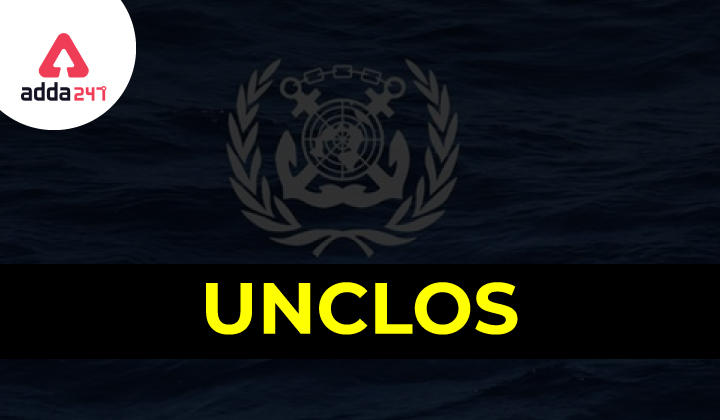GS Paper – 2: Effect of Policies & Politics of Countries on India’s Interests
Introduction:
The United Nations Convention on the Law of the Sea (UNCLOS) is an international treaty that was adopted and signed in 1982 in Montego Bay (Jamaica). It replaced the four Geneva Conventions of April 1958, which respectively concerned the territorial sea and the contiguous zone, the continental shelf, the high seas, fishing and conservation of living resources on the high seas.
Importance:
Over time, the Convention has become the legal framework for marine and maritime activities. The appropriate political body to handle them is the General Assembly of the United Nations. This principle is recalled each year in the resolution on the law of the sea adopted by the UNGA.
The Convention has created three new institutions on the international scene :
– the International Tribunal for the Law of the Sea,
– the International Seabed Authority,
– the Commission on the Limits of the Continental Shelf.
Parties:
The Convention came into effect in November 1994. It now has 162 Parties including the European Union for its share of jurisdictions.
Why the USA is a non-subscriber?
- The USA is the most important non-subscriber to the UNCLOS, solely due to its strong opposition to the regime concerning the exploitation of natural resources on the seabed beyond national jurisdictions.
- Aside from this particular position, the USA considers the rules of the Convention as a continuation of existing regulations in the law of the sea, because they are the expression of customary law (for example, freedom of navigation and, in general, rules applying to the high seas);
- elsewhere, the USA has integrated legal entities created by the Convention into its national law, such as the Exclusive Economic Zone or EEZ.
UNCLOS’s major prescriptions:
- The UNCLOS prescribes the EEZ as an area of the sea in which a sovereign state has special sovereign rights regarding the exploration and use of marine resources, including energy production from water and wind.
- It stretches from the baseline out to 200 nautical miles (370 kilometres) from the coast of the sovereign state.
- Similarly, the territorial sea (TS) as per UNCLOS, is an area extending up to 12 nautical miles from the base of a country’s coastline.
- The difference between EEZ and TS is that a state has full sovereignty over the waters encompassed within the TS, whereas with regard to the EEZ, the state merely has exclusive sovereign economic rights to substances lying below the surface of the sea.
- Furthermore, Article 58 of the UNCLOS encapsulates the principle of freedom of navigation and innocent passage in the EEZ for all vessels, including an FMV, regardless of consent from the coastal state.
India’s Stand on UNCLOS:
- India is fully determined to protect the legitimate rights and interests of our country in relation to our territorial waters and Exclusive Economic Zone, while supporting the maintenance of rule-based maritime systems, as mandated under UNCLOS, 1982
- India is committed to respecting the rights of all nations as laid down in the UN Convention on the Law of Seas (UNCLOS)

Challenges in Indo-Pacific Region:
- While competition over resources has intensified, the rise of serious threats such as terrorism, piracy, drug trafficking and climate change has thrown new challenges for the Indo-Pacific region.
- The nature of these challenges in the region has considerable trans-national implications, which require a cooperative response. There is, therefore, a need to find a convergence of interests and commonality of purpose on maritime issues.
- There is a day-to-day competition for influence, leverage and geostrategic space that is increasingly being witnessed in the Indo-Pacific.
Why does India need to strengthen its Maritime Laws?
- Ocean-based trade contributes to 95 per cent of India’s total trade in volume and 70 per cent in value.
- A recent freedom of navigation operation (FONOP) conducted by a US warship in India’s exclusive economic zone (EEZ) on April 7, 130 nautical miles west of the strategically important Lakshadweep Islands, has brought to sharp relief the limits on India’s sovereignty in the regulation of its EEZ and its relationship with customary international law and the United Nations Convention on the Law of the Sea (UNCLOS).
- The incident is a reminder that India needs to have efficient regulation of the EEZ despite inherent limitations presented by CIL and UNCLOS.
- The Indian Act (Territorial Waters, Continental Shelf, Exclusive Economic Zones and Maritime Zones Act, 1976) does not impose the requirement of a prior notice on an FMV before entering the Indian EEZ (not sovereign Indian territory). So a stringent law is the need of the hour.



 TSPSC Group 1 Question Paper 2024, Downl...
TSPSC Group 1 Question Paper 2024, Downl...
 TSPSC Group 1 Answer key 2024 Out, Downl...
TSPSC Group 1 Answer key 2024 Out, Downl...
 UPSC Prelims 2024 Question Paper, Downlo...
UPSC Prelims 2024 Question Paper, Downlo...




